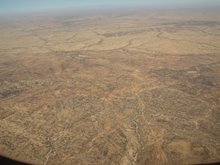The real answer to this question is very little. Samantha Powers appears to be right. When great countries are faced with the moral enormity of genocide the response is public outrage and fierce rhetoric to disguise inactivity and policy failure. Over the last three years the UN Security Council, the US and the EU have alternated between indecision and confusion, whilst Khartoum has been allowed to flout Security Council Resolutions, cease-fires and the protocols of internationally mediated peace deals with impunity. The AU, for a myriad of reasons, has failed, no sanctions regime has been imposed, nor has a no-flight zone. Humanitarian space is not being protected, aid workers are becoming victims in what is now a degrading spiral of atrocity.
Whilst the international debate over Darfur has provided high drama the reality is that no effective political pressure been applied to stop the war. Billions of dollars in humanitarian aid, hundreds of high profile visits and thousands of pages of documentation are nothing but a disguise for the blushing absence of consequent action. A series of completely failed interventions, such as the Darfur Peace Agreement signed in 2006, have been pursued to the bitter end whilst well-known effective measures have not been taken.
The one measure that could now be effective is the enforcement of targeted sanctions against members of the regime, as suggested by the International Crisis Group in their latest report on Darfur. Yet this, the most effective instrument of policy that we have left, is quietly accepted as politically impossible by many of the policy makers within the US and EU.
In comparison Khartoum has firmly and resolutely prosecuted its brutal war. For the security clique that controls Khartoum, no international pressure means that there has been no reason to risk the internal opposition and potential instability that might result from changing policy. Without pressure why risk disarming the Janjaweed who could easily turn their weapons on government soldiers? Furthermore in this era of Iraq and Afghanistan standing up to the West can give a boost of Islamically inclined political legitimacy to even a brutal dictator like Omar al-Bashir.
As a result, in Darfur an estimated 4 million people are now either displaced or destitute, 50% of these are now isolated in rural areas outside of camps were humanitarian services can be provided. The war has spread into Chad and the Central African Republic, both desperately poor countries that came 170th and 171st out of 177 in the World Bank’s World Development ratings in 2006.
This is not a call for any misguided militaristic adventurism. In Iraq the world has learnt (again) that relying on military force to bypass undesirable political realities is a delusional strategy. The resolution to the current problem is, and always has been, political. The international community must create a space in which rebels are able to unifying and prepare for a renegotiation of the Darfur Peace Agreement. To do this it must exert meaningful pressure on the government of Sudan which is actively seeking to fragment the groups.
The reality is that Sudan as a whole is spiralling slowly towards state failure. Whilst the International Community has invested its words and resolutions in Darfur the South of Sudan has been quietly forgotten – without political attention reconstruction funding has been released painfully slowly and the modalities of the CPA have been progressively breached. Whilst many in the UN and World Bank are putting their faith in the legislative and presidential elections to be held in 2009, the Government of South Sudan is spending 40% of its fiscal budget on defence.

No comments:
Post a Comment